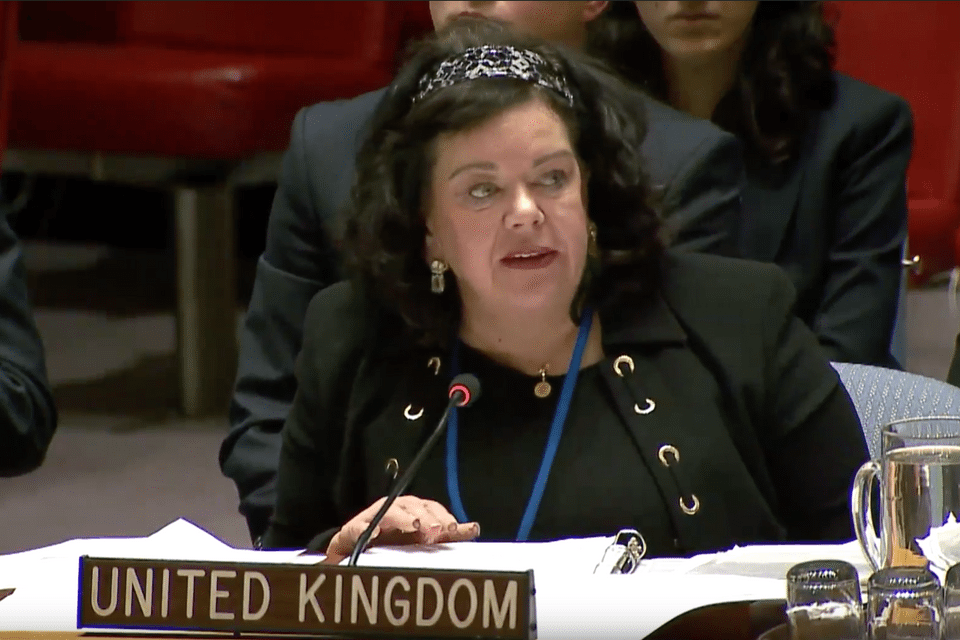Humanitarian situation in Syria: statement to the UN Security Council
Statement by Ambassador Karen Pierce, UK Permanent Representative to the UN, at the Security Council Briefing on Syria.

Before I start may I make a request to the Secretariat? It would be very helpful I think for the Council to have either a briefing or a brief account of where the Organisation for the Prohibition of Chemical Weapons (OPCW), Fact-Finding Mission (FFM) and the United Nations Department of Safety and Security (UNDSS) currently are and what their forward plans are and if there has been any delay in their getting into Douma an account of what has caused that delay. So if it were possible to have that within the next 24 hours Mr President, I would be very grateful.
Turning to the issue before us in this session, I’d like to join others in thanking the Under-Secretary-General for his briefing.
It’s a pity that some speakers have used today’s account of the humanitarian situation to make political points and I recall Mr. President, an English philosopher Edmund Burke who said; “It’s generally a popular error to imagine that the loudest complainers for the public are those who are most anxious for its welfare.” And I think that might apply rather too much today.
We’re talking about Resolution 2401. I don’t have the full compendium of the British government’s activities on the humanitarian side in Syria but I can say that in 2017 we gave a $160 million to the UN appeal and in 2018 we are giving $138 million. This compares to $5.5 million in 2017 from Russia and as far as I know zero in 2018. We are one of the top three donors to the Syrian humanitarian response plan and we are the second largest bilateral donor to the humanitarian response in Syria since 2011.
To date we have committed $3.5 billion dollars in response to the Syria crisis and this Mr. President, is the United Kingdom’s largest ever response to a single humanitarian crisis. We encourage all of us to do what we can to support the UN appeals and we too will be playing an active role in the Brussels conference which is to come.
Turning to Raqqa Mr. President, we welcomed the first U.N. assessment mission. The United Kingdom continues to provide humanitarian support to Raqqa and surrounding areas. Last October, we stepped up our support to north-east Syria and this was to restock hospitals and mobile surgical units. It was to provide a 145,000 medical consultations and 31,000 relief kits. This included cooking equipment and blankets and we helped improve access to clean water for 15,000 people. We are also contributing to the clearance of mines and explosives in Raqqa and we are looking at ways to provide additional support to mine clearance across Syria.
Turning to Rukban, I would like to take the opportunity to commend the government of Jordan for providing humanitarian access to the population including a distribution of essential aid and this was in January 2018. We commend the efforts of the UN humanitarian agencies who have been negotiating access from Damascus.
I would like to emphasize the right to displaced civilians in Rukban, in the so-called Berm, to protection and sustained humanitarian services and distributions. Whether these are cross-line and cross border and this is in accordance with humanitarian principles and international humanitarian law.
We urge the Regime and its backers to facilitate access for the UN and humanitarian partners to deliver desperately needed assistance to the estimated 70,000-80,000 people in Duoma and all those remaining in the Eastern Ghouta. Like other speakers Mr President, we too are concerned about the poor conditions in these camps and sites where people from Eastern Ghouta there have fled.
We look forward to a position where they can have freedom of movement and where they can be allowed to return home. In the meantime, they must be protected against regime reprisals and we have in consultations Mr President, in an earlier stage asked for more attention to be given by the UN but also by the Syrian government to giving visas to UN staff who can go in and help form a protection function.
Mr President, I had intended to speak about the political resolution and next steps but the French Ambassador has laid this out very clearly and I have nothing to add to that but to say, I wholeheartedly support what he said and I think we call on all members of the Council to rally to the notion that we should use what has happened as an opportunity to get the political process back on track.
We want to have a very good discussion of possible ways to do so. As our retreat in Sweden where we will have the benefit of a Secretary-General as well. Mr President, in closing let me end with one of Edmund Burke’s more famous pleas; “All that is needed for the triumph of evil is for good men to do nothing.” Mr. President, we can all do something and I hope we will use the next days wisely.
Thank you.